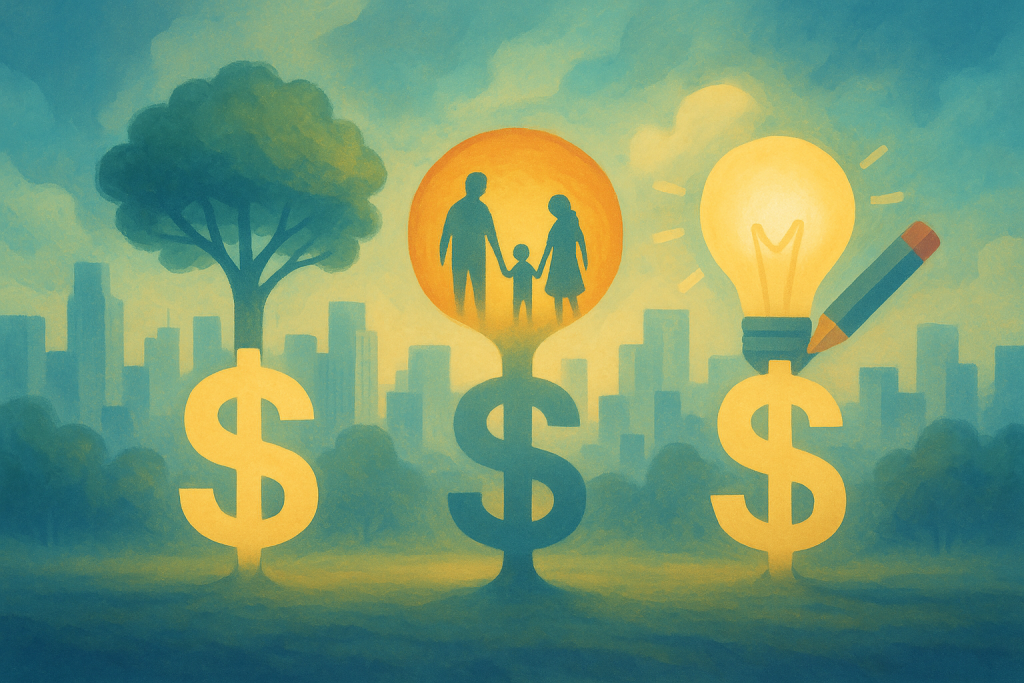In recent years, Americans have been redefining personal wealth, moving away from traditional monetary measures to embrace a more holistic understanding of prosperity by 2025. This shift emphasizes not only financial security but also aspects like mental well-being, time freedom, and social connectivity.
With a growing awareness of life’s multifaceted nature, people are seeking to balance economic stability with personal fulfillment. While money remains important, its role is now just one piece of a larger puzzle. In this evolving landscape, having a well-rounded, enriched life constitutes genuine affluence for many individuals across the United States.
The new definition of wealth

For years, wealth was predominantly measured through financial assets, including bank accounts, property, and investments. However, as we approach 2025, a fresh perspective on what constitutes true fortune is emerging nationwide. This involves valuing life experiences, personal development, and time just as much as financial success.
Now, Americans are seeking holistic fulfillment where wealth is equally represented by a well-balanced life, meaningful work, and satisfying relationships. Ultimately, this new paradigm focuses not only on fiscal gain but on the quality of life and personal satisfaction.
Recognizing that wealth extends beyond dollars and cents has shifted goals for many. Modern definitions now include time affluence—having the freedom to decide how to spend one’s time—and the importance of mental and emotional health. These elements contribute significantly to a person’s overall sense of being wealthy.
Social connections have become another integral component of wealth. People are increasingly aware that networks and relationships can provide support, opportunities, and joy. In America’s evolving perception of wealth, having a robust set of connections with family, friends, and communities is as valuable as a big bank account, and often more essential for long-term happiness and success.
Health as the ultimate currency
With health becoming a focal point in the new conception of prosperity, many Americans regard well-being as the quintessential form of wealth. Physical and mental health are being prioritized above financial achievements, as individuals acknowledge that without good health, it is challenging to fully enjoy life.
Access to healthcare and healthy living options have gained prominence in discussions about wealth. Americans are channeling resources into preventative measures, mental health services, and wellness practices that support long-term health. This shift reflects a deeper understanding that true wealth is having the vitality and well-being to live a full, enjoyable life.
Organizations and companies are also catching on, promoting health and wellness programs, recognizing that a healthy workforce is a productive one. Initiatives that focus on employee health, mental well-being, and work-life balance are becoming standard, emphasizing that when individuals thrive, so do the entities they contribute to.
Time as a valuable resource
Redefining wealth to include time freedom reflects Americans’ desire for autonomy over their schedules. Many realize that having the luxury to control and choose how they spend their time is a form of richness. Achieving a balance between work responsibilities and personal pursuits is often valued more than traditional economic indicators.
Technological innovations and the rise of remote work have supported this shift, offering flexibility and enabling a better work-life harmony. People are increasingly looking for job opportunities that allow remote work, flexible hours, or reduced workweeks, prioritizing time over conventional career paths.
This recalibration emphasizes a life where commitments are intentional and meaningful. Rather than subscribing to a constant hustle, individuals value the ability to pursue hobbies, spend time with loved ones, and engage in self-care. The realization is clear: indeed, time is money but used wisely, time is a wealth multiplier.
Financial stability and beyond
Though traditional economic stability still plays a crucial role in the new wealth paradigm, it now operates in concert with elements such as personal happiness and community involvement. Americans understand that financial underpinnings are essential for security and peace of mind but alone cannot ensure a wealth of life.
The integration of financial education into schools and communities reflects this adjustment. People are encouraged to establish financial health that supports their aspirations, securing their future while enabling them to live richly today.
Moderating debt, investing wisely, and living within one’s means are seen as critical to experiencing holistic wealth. As the saying goes, money can’t buy happiness, but used effectively, it can create opportunities for increased life satisfaction and fulfillment.
Community and connections
Communal ties and social interactions significantly contribute to redefining wealth in America. Connections foster a sense of belonging, emotional support, and shared experiences that enrich life beyond what individual achievements offer.
Social capital, the resources gained through networks and relationships, offers valuable benefits in both personal and professional spheres. For many, being embedded in a supportive community is far wealthier than standing alone with material riches.
Efforts to build and maintain vibrant communities can be seen through increased community projects, volunteerism, and social initiatives that aim to bring people together and improve overall quality of life. These efforts highlight the growing recognition that a rich life involves nurturing, supportive and dynamic networks.
